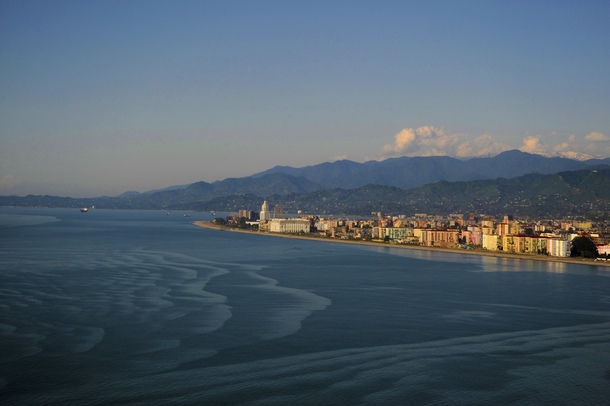When I last visited Batumi, the Soviet empire was in its final death throes. Nestled around a fine Black Sea harbor, Batumi had every appearance of a place that had seen finer days. It was grimy, dimly lit, and poorly maintained, the handful of turn-of-the-century Mediterranean-style villas being overtaken by disheveled apartment blocks of the Krushchev era. My handlers insisted on a tour of the city’s principal landmark: a decrepit oil refinery, the beacon of Adjara’s entry into the industrial age. The refinery was filthy and in obvious disrepair, boasting technology at least fifty years out of date, and the casual pollution associated with it was appalling, forcing the natives to avoid the oil-stained beachfronts and polluted waters.
Jumping forward twenty years, I find the city marvelously transformed. The oil refinery has disappeared. In its place is a splendid emerging resort. Long beaches are packed with tourists, the sea is filled with swimmers and boaters, and the sky overhead with hanggliders. Their revels are interrupted only by the steady sound of jackhammers, because Batumi is also in the midst of a construction boom.
Sheraton has now opened the city’s new landmark: a hotel constructed in imitation of the ancient lighthouse of Alexandria. Radisson and Kempinski are also putting finishing touches on hotels, each a glass-covered geometric wonder. Smaller hotels and b&bs sprout in nearly every block of the old city. Batumi is emerging as the Black Sea’s newest and poshest resort.

Batumi sits at the heart of the Autonomous Republic of Adjara (in Russian, Adzharia) one of three enclaves inside Georgia that existed more under the sway of Moscow than Tbilisi in the republic’s early years. Each of these enclaves followed a similar pattern—democratic reforms were kept at bay by a local petty dictator, operating with Moscow’s blessing and support. The economy stagnated and change was a distant dream. However, the Adjarans—unlike the Abkhaz and the Ossetins, the nominal ethnic groups in the other two enclaves—had no difficulty identifying themselves as Georgians. Their distinctiveness lay essentially in the legacy of centuries as a part of the Ottoman empire: most of the population had converted to Islam. In the wake of Georgia’s Rose Revolution, however, a strong youth movement in Adjara demanded the ouster of the Moscow-loyal local rulers and reunification with Georgia. A quick and relatively bloodless uprising led to the accomplishment of this goal in 2004.
At this point there’s little reason to doubt that the Adjarans made the right move. Money began to flow into the region, and Batumi’s population spurted to 200,000, with some boosters expecting it to double within the coming decade. A magnificent five-mile long esplanade has been constructed directly behind the beachfront, filled with pavilions, restaurants, bandstands, dancing fountains, and a disco copied from one in St. Tropez. One section caters to youth sports, with skateboarding courses and sports courts. The entire city seems to sit in the midst of a forest of palm trees—in part the largesse of the emir of Abu Dhabi, who donated 18,000 date-palms to support the city’s redevelopment as a resort.
Batumi also plays a key role as the starting point for a new transit corridor from Europe across the Black Sea and by truck from Turkey on for 400 kilometers to Tbilisi, and then on to Baku and the Caspian Sea. An Autobahn-style highway is being planned, together with a high-speed rail line (the first station for which, mimicking the style of the French TGV station at Paris-Charles De Gaulle Airport, has just opened in Batumi). The corridor will carry consumer goods from Europe and energy and natural resources from the Caspian littoral and Central Asia.
Batumi’s transformation has been driven by energetic young local leaders, strongly backed by Georgia’s somewhat autocratic president, Mikheil Saakashvili. He started his career as a Wall Street lawyer before returning home. Saakashvili counts among his advisors a senior foreign-policy counselor from John McCain’s presidential campaign, the son of a prominent former Democratic governor, and the son of French philosopher André Glucksmann. “My critics call this Saakashvili’s phallus,” he said, laughing and pointing to a tall glass structure called the “frozen fountain.” “But maybe they just have fountain-envy.” Reading Russian press accounts, you’d think Saakashvili was a nutcase detested by his own people. But on a stroll down the Batumi esplanade, shouts of “Misha!” went up as he was thronged and greeted by adoring young people, many of them pleading for the chance to have their picture taken in his company. The people of Batumi have also given him a new nickname—“Misha the Builder.” In a conversation at a bar that evening, a fifty-something Georgian businessman told me that he resented the way his generation had been brushed from power by the Rose Revolution, but he couldn’t deny feeling admiration for the way the “kids” had transformed country. “They have a different vision of what was possible. And they are turning it into reality. I never imagined this could happen in my lifetime.”


